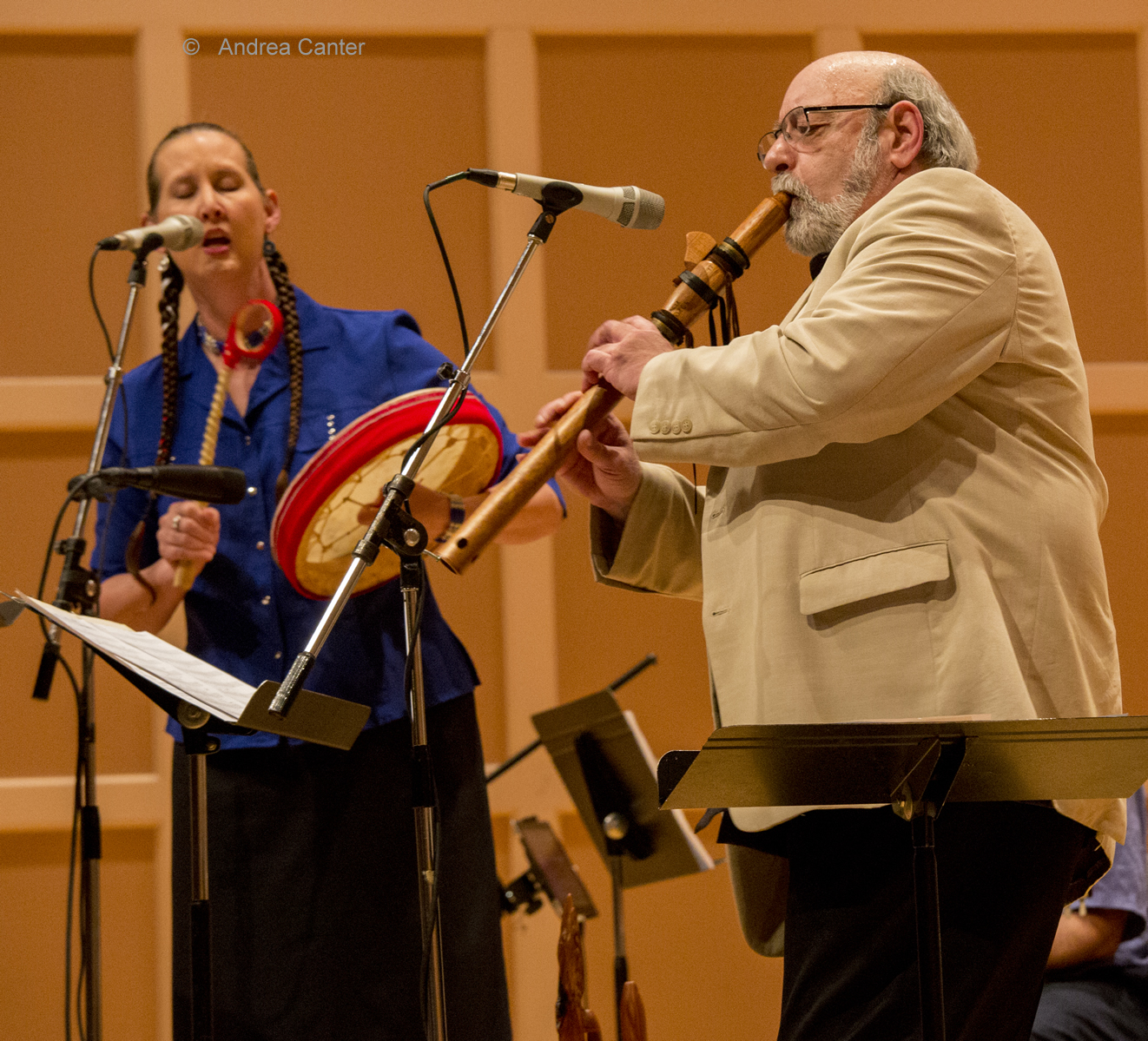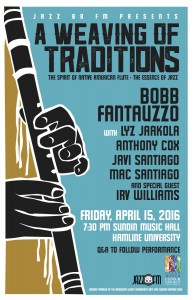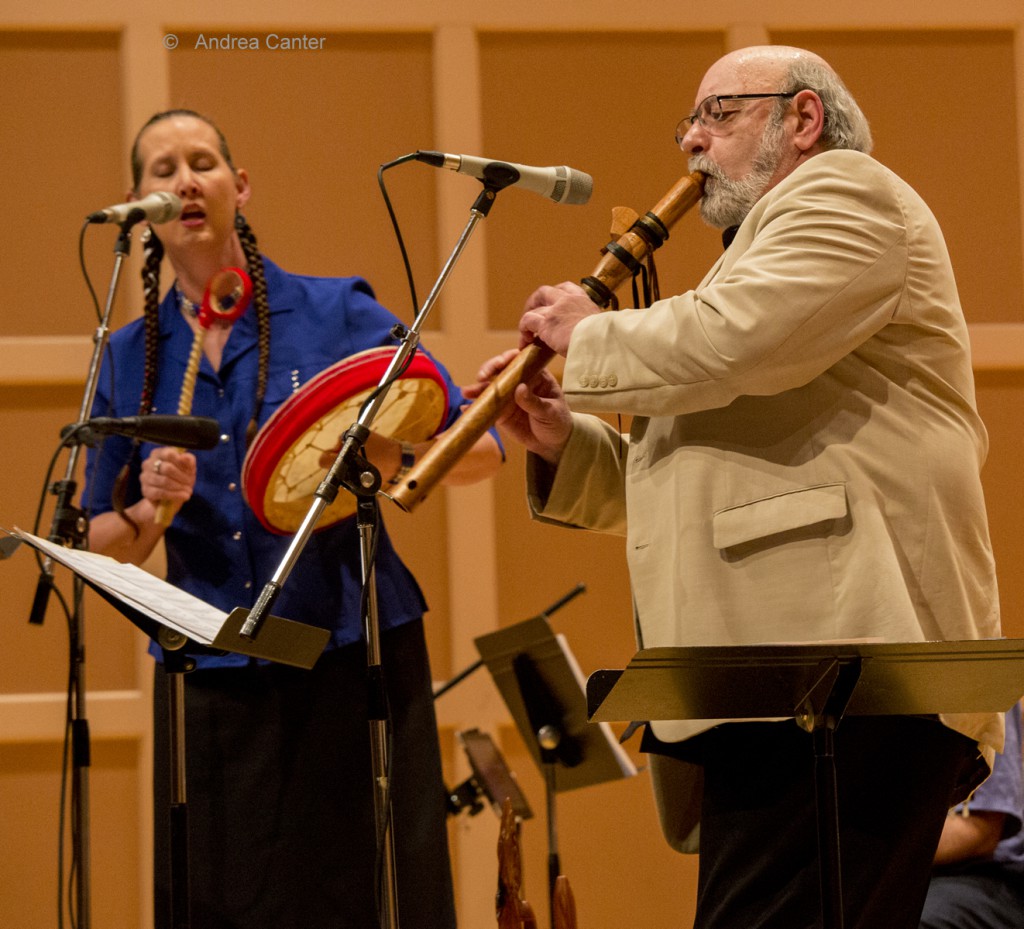
Before jazz became part of traditional American culture, Native American music was a thriving art form. Bringing these styles together, KBEM Jazz 88 presents A Weaving of Traditions on Friday, April 15, at 7:30 pm in Hamline University’s Sundin Music Hall in St. Paul. Melding “the spirit of Native American flute with the essence of jazz,” this program pays tribute to jazz musicians with Native American roots, including Miles Davis, Dizzy Gillespie, Charles Mingus, Thelonious Monk and others. One of the few individuals playing jazz on the Native American style flute, Bobb Fantauzzo also headed an earlier “Weaving of Traditions” concert in 2013, featuring his trio JazzZen and Native musician Lyz Jaakola. Jaakola (traditional Anishinaabe vocals and percussion) returns to join Fantauzzo in this new performance, along with local jazz stars Anthony Cox (bass), Mac Santiago (drums), Javi Santiago (piano), and special guest, Irv Williams (saxophone).
Jazz and Native American Music –Weaving of Traditions
There have been many connections among jazz and Native American music, particularly a number of jazz luminaries of Native ancestry in addition to Davis, Gillespie, Mingus and Monk –Dave Brubeck, Duke Ellington, Lena Horne, John Lewis, Doc Cheatham, Charles Lloyd, Jim Pepper, Oscar Pettiford, Frank Trumbauer, Don Pullen, Art Farmer, Joe Williams and influential rock guitarist Jimi Hendrix. A primary goal of the Weaving of Traditions projects is to pay tribute to both their music and their Native heritage. Legendary bassist (and Minnesota native) Oscar Pettiford contended that “the importance of the American Indian to jazz has been underestimated if not completely overlooked.” He also maintained “the 4/4 tempo …came directly from the American Indian; that, though it existed in European music, it was not used in the same way; and that African rhythms …were of very different rhythmic nature.” Trombone great Jack Teagarden asserted that his music was influenced by “American Indian chants” he heard in his youth. And Duke Ellington’s sister, Ruth, told Dave Brubeck, “All the credit’s gone to the African for the wonderful rhythm in jazz, but I think a lot of it should go to the American Indian.”
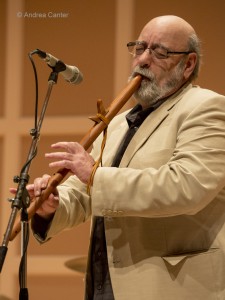
The Musicians
Bobb Fantauzzo discovered Native American flutes in 1998, and soon began blending the Native sound with American jazz. Bobb also performs with The Semi-Conductor Orchestra and The Intangibles, and serves as the facilitator of the Ten Thousand Lakes Flute Circle of the International Native American Flute Association (INAFA). He plays Chinese as well as Native American flutes. In addition his collaborative recordings (Explorations and Bounce of the Moon), he released Sirocco—Winds of Passion.
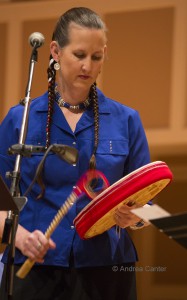
Elizabeth (Lyz) Jaakola is a member of the Fond du Lac band of Lake Superior Ojibwe. After earning her degree in vocal performance, she taught at a tribal school as a music specialist before turning to a performing career. She’s performed in the Rome Opera Festival, choral music at Carnegie Hall, in traditional ceremonies, and in jazz and blues settings at venues in northern Minnesota. After earning a Masters in Music from the University of Minnesota-Duluth, Lyz returned to teaching (music and Indian Studies) at Fond du Lac Tribal and Community College, building a repertoire of Native-based choral music and promoting Anishinaabe music. She performs with her blues band (Lyz Jaakola and the Smokin’ Chimokes) and recording with various projects, including handdrum and youth choral ensembles.
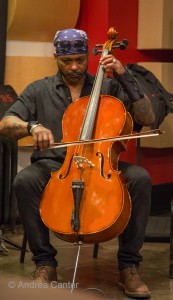
Anthony Cox studied bass at the University of Wisconsin Eau Claire, then headed to New York, building a reputation that took him on tour with Stan Getz. In the early 90s, he returned to the Twin Cities but his career has hardly been limited by his residence. Over the years, Cox has worked and/or recorded with Joe Lovano, Sam Rivers, Dewey Redman, Geri Allen, Arthur Blythe, and Uri Caine, playing upright acoustic, electric and Spanish acoustic bass as well as cello. With Bill Carrothers and Jay Epstein, he has performed and recorded as Easy Company, and recently has appeared at the Icehouse, Dakota, Jazz Central and Black Dog. He leads several ensembles including the Regional Jazz Trio and DD7, and is a member of the Atrium Jazz Ensemble, with whom he recently debuted “The Rage of Achilles” at Orchestra Hall, co-written with Jeremy Walker.
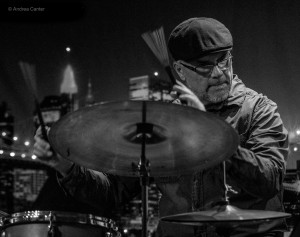
Mac Santiago is a familiar figure to Twin Cities jazz audiences as well as musicians. A native of California and son of the late percussionist Luis Santiago, he has been playing music professionally since age 16. After attending Sonoma State University for three years, he graduated from Idaho State University with a Bachelor of Music. He toured for a few years before moving to the Twin Cities in 1983. Over his career, Mac has played in just about every possible configuration and genre, from touring with British rock band Badfinger to playing with area jazz, salsa, country and R&B bands; he’s performed in pit orchestras of the Guthrie and Minnesota Opera, with blues legend Mojo Buford, Grover Washington, Jr., Doc Severinsen, Dallas Brass, Savion Glover, Jack McDuff, Paul Bollenback, Dick Oatts and more. Mac has backed a long list of area vocalists and instrumentalists, and has directed community youth jazz groups. In 2010, Mac cofounded Jazz Central Studios in northeast Minneapolis, a nonprofit venue for teaching, recording, and performing, with live music at least five nights per week.
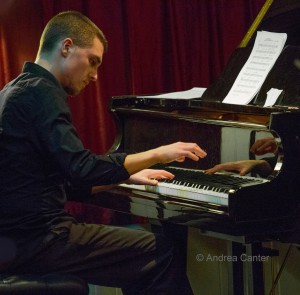
Mac’s son Javi Santiago is one of the area’s most sought-after young lions for his prowess as pianist and composer. Studying piano from age 7, Javi was already active on the local jazz scene in his teens, playing with the Dakota Combo, Minnesota Youth Jazz Band, and several student ensembles. He was selected as the pianist for the prestigious Brubeck Fellowship program for his first two years of college studies, completing his degree at the New School for Jazz and Contemporary Music in Manhattan. After a few years on the New York scene, Javi returned to the Twin Cities where he has performed with both veterans and up-and-coming young artists at the Dakota, Icehouse, Jazz Central, Black Dog, Twin Cities Jazz Festival and more. He released an EP of original music last year, Year of the Horse.
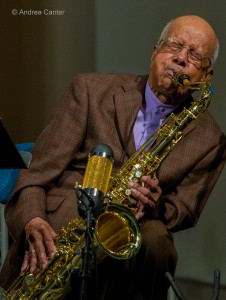
At 96, Irv Williams is the working elder of the Twin Cities Jazz community. Raised in Cincinnati and Little Rock, Irv started out on violin, switched to clarinet at age 11 to counter the effects of bronchitis, and soon moved on to saxophone. Early in his career, he played in bands behind Ella Fitzgerald, Fletcher Henderson, Mary Lou Williams, and Billy Eckstine at such venues as the Apollo Theater and the Howard Theater. Irv first performed in the Twin Cities as a clarinet and sax player with the Navy during Word War II. Turning down invitations to play with Count Basie and Duke Ellington, he stayed in the Twin Cities where he taught in the St Paul Public Schools and played with the late Reginald Buckner. And here at home, Williams has played at every jazz venue, past and present, including the old Flame Bar where he was often back to back with such stars as Sarah Vaughn, Dizzy Gillespie, and Johnny Hodges. The first jazz musician to have his own “Irv Williams Day” granted by the State of Minnesota (1984), he has been inducted into the Minnesota Jazz Hall of Fame and was pictured on the “Celebrate Minnesota” official state map in 1990. Throughout his eight-plus decade career, Williams has focused on the Great American Songbook and the tenor sax as a solo vehicle. His knowledge of the idiom is legendary and fellow musicians marvel at his ability to play any song in any key.
The production of A Weaving of Traditions is made possible through funding provided by the Minnesota Legacy Amendment Arts and Cultural Heritage Fund. The performance will be recorded for later broadcast, and will be made available to everyone through the station’s “on demand” page of the website.
Sundin Hall at Hamline University is located at 1531 Hewitt Av, St. Paul. Tickets for A Weaving of Traditions are $15 in advance and available at Jazz88fm.com, or $20 at the door.







